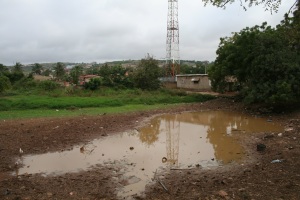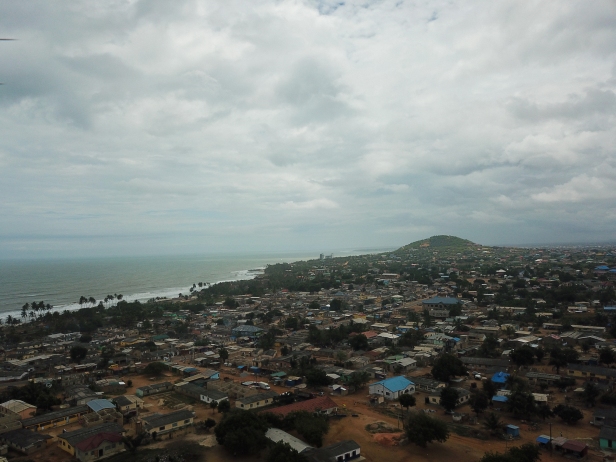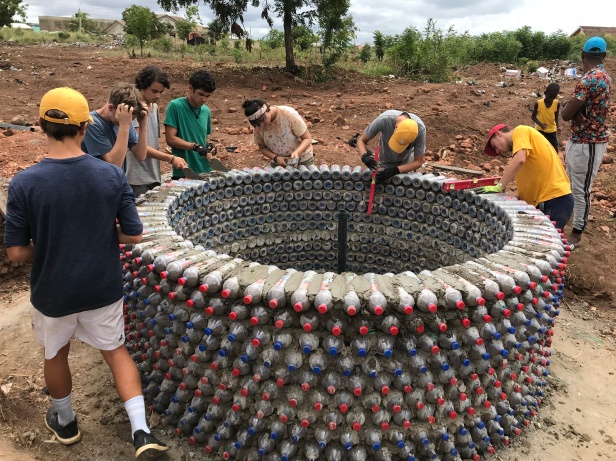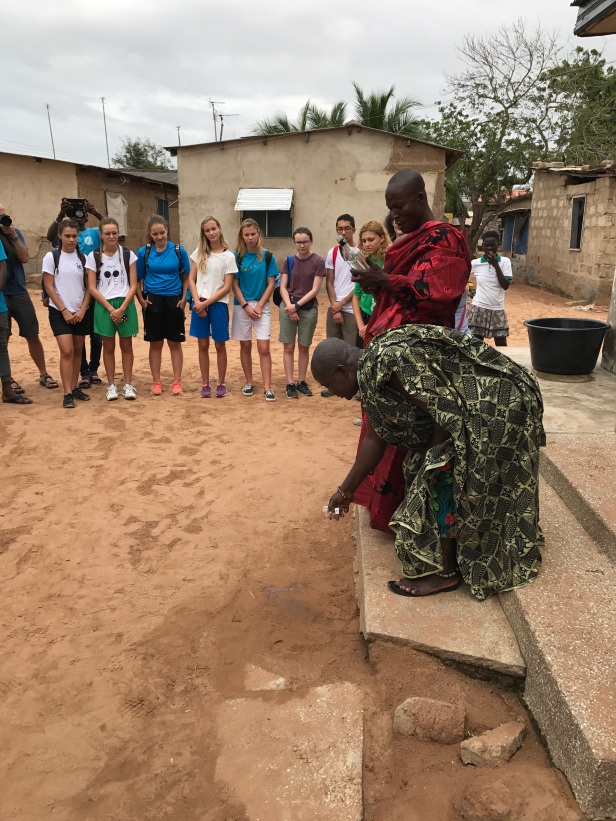Service learning can challenge the skills students will need to thrive in a rapidly evolving world, developing multicultural fluency and making abstract subjects real, meeting an authentic need with their learning
How to bring fresh water to a village of 5000 people?
Kokrobite is a fishing village 30km west of Accra in Ghana with no reliable mains water, meaning villagers have to rely on expensive bottled water or drink from standing water with the resulting chronic health problems. When we asked our hosts to identify the needs of the community and how we could help, they identified this as the most urgent challenge.

The Kokrobite Chiltern Centre (KCC) was established by Jane and Martial Zouhoungbogbo to support the education of children in the village. The International School of Zug and Luzern (ISZL) has had a direct partnership with them for 5 years now. The KCC enables children to finish their schooling with a dedicated learning centre where there is space and resources to study after school, food, clothing and school materials, and sponsorship of children’s school fees and equipment. They directly or indirectly support over a thousand families in Kokrobite.

ISZL Students visit Kokrobite annually to help support KCC provide fresh water for the community.
Tackling an authentic need
The solution implemented was water tanks built from plastic PET bottle bricks laid with local laterite clay. The inventor of these techniques trained us in 2016. This would use cheap building materials and contribute to solving the problem of plastic waste in the community.

Some water tanks could then also used in an aquaponics system: a closed loop of fish farming and vegetable cultivation, with the waste from the fish fertilising vegetable growing, that in turn filters the water to be returned to the fish.
Service learning: making abstract subjects real
Service Learning is defined by the IB as “the development and application of knowledge and skills towards meeting an identified community need”. In this project, there are authentic links to students’ studies in school. In Geography, students have investigated water and food security at global and local scales and had studied aquaponic systems as a possibility for food security in the future. They also evaluate solutions to waste processing. For the aquaponics system, the nutrient cycling is a core element of biology and environmental systems courses. The waste water from the fish must settle in a separate tank with a volume 25% of the main tank. Calculus is accused of having limited relevance to student’s lives but a star student could apply the concepts he had studied to calculate the required dimensions of this tank.
A fascinating consequence of this innovative PET bottle building technique was the realisation that waste plastic was being commoditised. It gained a value that it did not previously have and people in the community would hoard these bottles to enhance their value! The economics students were quick to apply their concepts to help explain this behaviour. There is a research project in this for someone…
The importance of intercultural awareness
Visiting Ghana for the first time is a culture shock. It is an assault on the senses and might also be the first time students have experienced norms and behaviours noticeably different to their own.
Working on a pioneering project in a challenging context brings cultural awareness to the forefront. Changing the supply of water in a community can change the political power structures and also the economics of this service. The first thing we have had to do on this project is consult with the chief and elders of the village, to gain their blessing and support. The blessing takes the form of a ritual libation, when the elders would make an offering of the Etter kirsch we brought as a gift, by pouring it onto the ground whilst saying a prayer and drinking together to wish the success of the project. Without this sensitivity it would be less likely we would have the support of the local community, or even the permission to pilot the water project.

Working in partnership with the Ghanaians demands further sensitivity to cultural norms. We could not immediately get ‘down to business’. Instead it has been important to invest time getting to know our hosts and understanding their motives and ambitions. A new friendship is sealed with a handshake that ends with a click of each others’ middle fingers: Watch a Ghana handshake
Finally, it has been important to manage our expectations and deal with slower progress, rather than insult people by complaining about delays to deliveries, services and power cuts. Being flexible and patient is essential. In an increasingly connected world, the intercultural awareness developed here is an increasingly important attribute. International mindedness, the result of engagement with global issues and intercultural understanding is at the heart of an international education and never better illustrated than in a project like this.
Developing essential assets
Every day on the project is a collaborative, problem-solving challenge.
Arriving at the work site, how can a perfectly straight footprint for 20m of vegetable trays holding the water from a tank be created to be perfectly horizontal so that the water does not flow away? Students had to design a leveling system without technical surveying equipment. How could they dig the holes for the supporting posts with a perfect square layout? Students were creating right-angled triangles with string and pegs, using Pythagoras’ theory to check the length of the hypotenuse. How to prevent the posts from rotting in tropical conditions? They would set them in gravel that would drain groundwater, and surround this with a collar of concrete.
In building the water tanks from PET bottle bricks, how many do we need in total? How fast can we fill them and produce them? How many of our team to work on this for how long each day? If we can only lay 4 or 5 courses of the bottles without the laterite clay mortar from deforming under the weight, how many do we need for each day?
First we need to excavate and pour the concrete foundations for the tank. What volume of concrete do we need? Do we have enough sand? How much water do we need in this case? Does the local water tank have enough? Do we need to order more from the delivery truck? How long until we can start laying bottles if we need to excavate 6 cubic metres of earth and then the concrete needs a day to set hard? How many of us do we need to excavate and mix concrete if we need to ensure the concrete is poured by the end of day 2 to allow enough time to build the tank by day 5?
At the same time, other teams are cutting the metal frames for the trays and drilling holes for the bolts whilst a third is designing and cutting/drilling the bamboo rafts to plant the vegetables in and a fourth working with the welder designing and forming the sheet steel trays and an efficient way to cut and join the pool liner. Who has the design know-how to oversee and deliver these crucial elements?

Then the power goes out. Can we source hand tools to replace the angle grinder and find more workforce from the other teams to make up for the loss in productivity? What are the knock-on effects to the other teams? How long before a generator could be installed? How to rotate roles when students get tired from the heavy labour?
Critical thinking, creative problem-solving, collaboration and communication are all crucial to the success of the project. These are often cited as the core competencies for students in the 21st century (WEF, 2015). They are 4 of the 10 Essential Assets of the ISZL Personal and Professional Skills course at the core of the IB Career-related Programme. They are Approaches to Teaching and Learning Skills at the centre of the IB Diploma Programme. Added to the agility and multicultural fluency students develop, this is a valuable skill-set they leave with.
The IB Career-related Programme combines a career study with students’ favourite diploma subjects. At the core is international mindedness, service learning and the personal and professional skills that prepares students to thrive in work and life. This experience for students at ISZL is a uniquely authentic, real-world embodiment of the ISZL and IB philosophy and a great example of future-ready education.
Thanks to Chris Koch, teacher at ISZL, for his inspirational and ambitious leadership of this project, and to ISZL for the continued support of this partnership.
References
World Economic Forum. (2015). A New Vision for Education(Rep.). Retrieved October 25, 2018, from http://www3.weforum.org/docs/WEFUSA_NewVisionforEducation_Report2015.pdf
